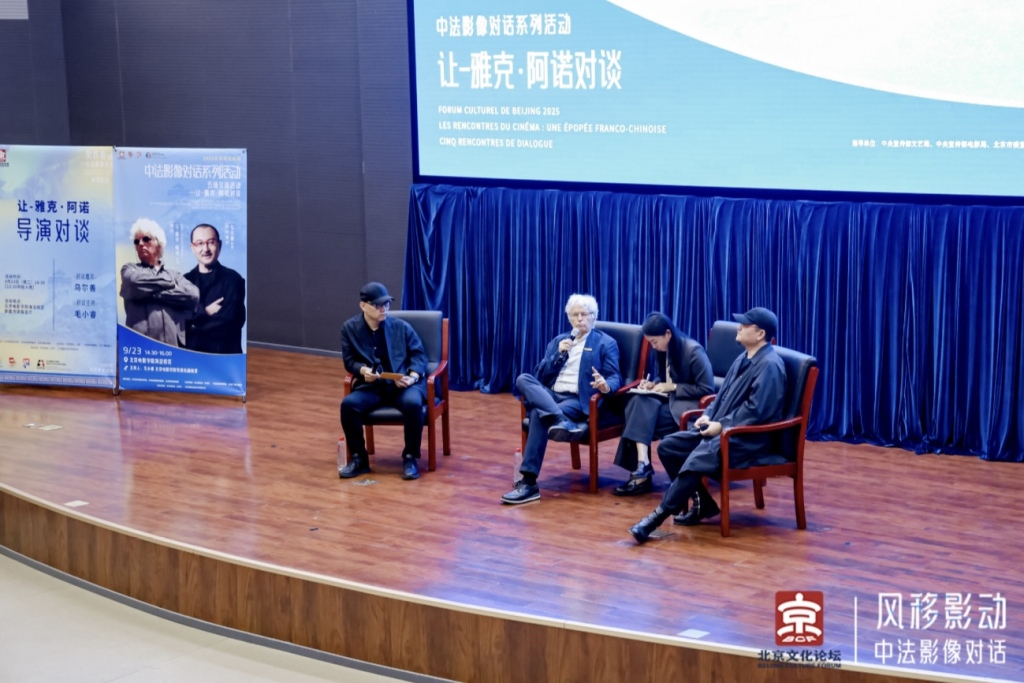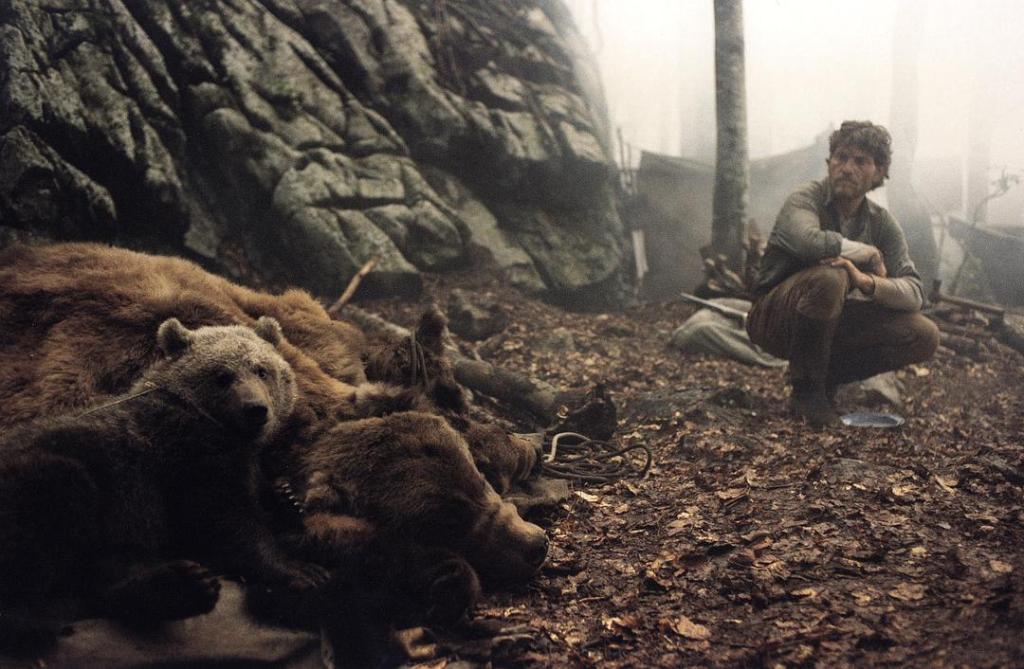
On September 23rd, the Jean-Jacques Annaud dialogue, part of the "Moving Winds, Moving Shadows—A Sino-French Film Dialogue" series of events, was held at the Beijing Film Academy's Haidian campus as part of the 2025 Beijing Cultural Forum. Moderated by Mao Xiaorui, Deputy Director of the Academy's Directing Department, the conversation focused on three key areas: cross-cultural creation, industry collaboration, and the development of a new generation of filmmakers. Renowned French director Jean-Jacques Annaud and Chinese director Wu Ershan engaged in a dialogue focused on intercultural collaboration, industry collaboration, and the cultivation of a new generation of filmmakers.

on site
Vision and emotion are key
Director Jean-Jacques Annaud talked about the creative process of the films "The Lover" and "A Bear Story", sharing the basis for his choice of subject matter, his unique understanding of cross-cultural narratives, and his experience and feelings about cross-cultural creation.
Director Arnold believes that "the power of images far surpasses language." For example, in the silent film era, "audiences around the world could understand emotions through images." He also emphasizes the importance of body language in film: "While films now have dialogue and music, body language is essential for audiences to understand the characters' inner thoughts. An actor's facial expressions and body movements are key to conveying emotion. For example, if I smile at you like this, everyone knows I'm happy; if I turn my back to you, it might seem disrespectful. This is the power of body language."

Stills from "Bear Story"
Wuershan started from the essence of human nature: "The commonalities among people far outweigh the differences. If I am moved by a certain emotional event, I believe that people from other cultural backgrounds will also be moved." He further pointed out that humans have used painting, language, and drama to tell stories since ancient times. Movies are nothing more than a high degree of integration of these forms of expression. "Storytelling is human instinct."
Director Jean-Jacques Annaud admitted about his script selection criteria: "Sometimes the basis for my choices is my own emotions, sometimes it's the public's emotions, but ultimately, the most direct response is my own reaction. Half of my films begin with scripts, and the other half are adapted from novels or books. If I read a book and can imagine the filming scene while reading the text, I am very willing to do it."
Jean-Jacques Annaud revealed that he has rejected hundreds of scripts over the years. "If a script makes me feel that I share the same emotions as others and makes me feel that it is worth spending four years on, I will do it immediately. This is also the reason why I have been able to persist in the film industry for 60 years. I wake up every day and cheer myself up, 'Today is great, I get to make a movie.' If I wake up and feel that the story is not good, I will not be able to continue. The ultimate goal of making movies is not to make money, but to have fun."

Jean-Jacques Annaud
Finding commonalities
The visuality of film is a common concern of both directors.
Jean-Jacques Annaud said that visualizing his ideas was not a problem for him: "Give me a photo of a newspaper right now, and I can quickly imagine it in the scene of my film. My role as a director is to convey my emotions through visualization, presenting my inner thoughts and characteristics in my work. For example, when making a film with a young woman as the protagonist, I would imagine myself as that young woman; when making a film about bears, I would see the common human qualities in animals. It is a process of expressing myself through other media."
He also reminded the students, "We must remember the influence of our genes and acquired culture. When creating, we can try to imagine ourselves as people from different regions and eras to broaden our visual thinking." Director Arnold has visited and worked with people from 41 different countries. "We should look beyond superficial things like language and living habits to discover the commonalities between people."
Director Wuershan, who studied painting since childhood, often creates films with a visual style reminiscent of oil paintings. He believes, "Painting is a frozen keyframe, devoid of time and sound, whereas film is an indivisible and complete expression of time and space. When I'm reading a subject or script, I imagine the scene in my mind. On set, I do my best to convince the actors of the story, detailing the art, costumes, and props, and creating atmosphere with imagery and lighting. When I can feel the emotion, I know the scene is working."
Wuershan believes that "common growth experiences, vision and ideals can bring people together to create miracles." The crew of "Fengshen" has staff from 21 countries. They brought new working methods and concepts and solved many problems.

Wuershan
Watch more, take more photos
When talking about film education, director Wuershan shared his own learning experience: "When I was at the film academy, my two favorite places to be were the film room and the library. I think there are two best ways to learn about film: one is to watch more movies, and the other is to make more movies."
The French film system has rich experience in balancing art and commerce, especially the support mechanism of CNC (French National Film Center), which protects creative freedom while focusing on industry cultivation.
Director Arnaud gave a detailed introduction to the support system of the French Film Center: "In France, you have to pay a 10% tax when you go to the cinema to watch a movie. These taxes will go into a fund pool to specifically support young directors in making their first feature film. Young directors have to obtain funds through competition. Even if their first film does average at the box office in their own country, it will be popular in other countries and will encourage them to continue creating. I myself have benefited from this system. My first film performed mediocrely in France, but received very good responses in other countries." He believes that this system is worth learning from other countries to help more young directors embark on their creative journey.
French films have also had a profound influence on director Wuershan. "When I was in school, we often watched and discussed Left Bank and New Wave films. The works of internationally renowned French directors like Director Arnold also inspired me a lot. My graduation thesis in the directing class was on Alain Resnais's Last Year at Marienbad. To prepare for the thesis, I watched it 30 times, carefully studying every shot and audiovisual language. The film left a very strong impression on me, and I received a 95% score on the thesis."

Last Year at Marienbad
Both directors are highly optimistic about the future development of Sino-French films. "In France, we have two film festivals dedicated to Chinese creators. We look forward to seeing more Chinese films appear on European screens in the future," said director Jean-Jacques Annaud.
At the end of the conversation, the two directors discussed the impact of AI on the film industry. Jean-Jacques Annaud stated that AI has been used in filmmaking for many years: "AI is like a magician, reducing production costs and shortening the process. We use it to process sound, change actors' faces, and manipulate backgrounds. What used to require 600 technicians can now be accomplished by three technicians and a computer. But remember, don't ask AI what story to tell; AI is more about providing technical assistance. I really enjoy using AI; it makes filmmaking more convenient."
Director Wuershan has longer-term thoughts: "Today, many AI works are just imitations of movies, relying on convenience and low cost to attract attention, but this is not the true meaning of AI. Just like when movies first appeared, they only recorded stage plays and later developed their own language. I hope that in the future AI can become an independent creative medium, form its own way of thinking and grammar, and produce new creations different from movies. That will be the beginning of AI truly becoming an independent art form. At present, it is still in a transitional stage, just like photography replaced portraiture. It is just imitating and replacing traditional crafts. There is still a lot of room for development in the future."